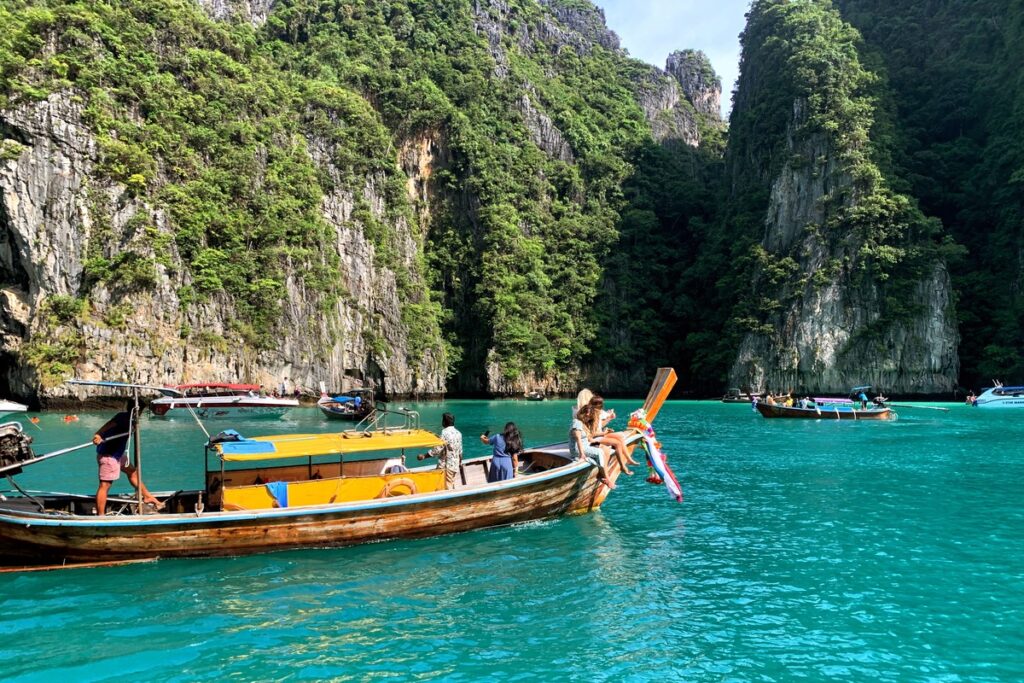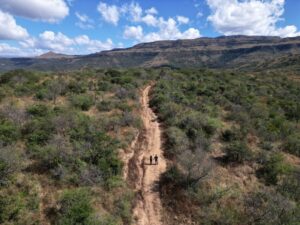Thailand is a country that captivates visitors with its rich culture, stunning natural beauty, and warm hospitality. It is also one of the most geographic arbitrage-friendly countries in the world, meaning your dollar stretches far, making it a great destination for digital nomads. From the bustling streets of Bangkok to the serene beaches of Krabi, Thailand offers an experience like no other. Foodies will delight in the country’s spicy and diverse cuisine, while history buffs can explore ancient temples and ruins. Those seeking adventure can trek through lush jungles or get scuba certified in crystal-clear waters. With a vibrant nightlife and a thriving arts scene, Thailand truly has something for everyone. So, pack your bags and get ready to be enchanted by this magical land of smiles.
General tips
When/where to go
Best time to visit: Thailand is a popular tropical destination that can be visited year-round. There are 3 main seasons in Thailand:
- Cool season (November – February): Many people consider this the best time to visit as the weather is more favorable and less humid. This also makes it the peak busy season so expect more crowds and higher prices.
- Hot season (March – May): These months can be hot and humid, especially in the South. Temperatures in Northern Thailand, however, are slightly cooler.
- Rainy season (June – October): Be prepared for possible heavy downpours and sometimes flooding but this means fewer crowds and cheaper prices.
Where to go:
- Bangkok: Busy capital city of Thailand, urban, nightlife, street food, Grand Palace, Wat Phra Kaew.
- Chiang Mai: North, Culture, history, temples, night markets, mountains, trekking.
- Phuket: Southern island, beaches, nightlife, snorkeling, diving.
- Krabi: South, white sand beaches, limestone cliffs, karst formations, rock climbing, island hopping.
Getting Around
Transportation: There are plenty of unique ways to get around Thailand using public transportation:
- Tuk-tuks: Small, three-wheeled taxis that are great ways to get around the city for short and medium distances.
- Songthaews: These are (usually red) pick-up trucks with two benches in the back that function like mini bus-taxis. They are usually used to get between cities or within a city.
- Longtail Boats: These traditional boats are a popular way to beach and island hop in Southern Thailand. Usually no set times, you can either wait for a boat to fill up and split the fee or pay the fare for the entire boat.
- Uber: We found Uber to be readily available and sometimes even cheaper than tuk-tuks.
- Buses: Thailand has an extensive bus network that connects most cities across the country which range from local buses to long-distance coaches.
- Trains: Train routes cover much of the country and are an affordable way to get between cities or long distances.
- Taxis: Taxis are widely available but tend to be more expensive than Tuk-tuks or songthaews.
- Motorbikes/Scooters: Great way to explore the countryside, but exercise serious caution in the city or heavily trafficked areas as these can be dangerous.
- Domestic flights: Good for longer distances, most domestic flights are pretty cheap.
Public bathrooms: In larger cities and tourist areas, you can generally find public restrooms with Western toilets in shopping malls, restaurants, and other public areas. However, in smaller towns and rural areas these may be less common and you may encounter squat toilets. Travel with your own hand sanitizer as soap (and sometimes toilet paper) can be hard to find.
Wi-Fi: Thailand is a digital nomad hub so you will find many cafes, hotels, and hostels with good WiFi infrastructure. Some public areas, parks, and transportation hubs will also have free WiFi.
Language
The official language of Thailand is Thai. In most of the tourist cities, people are very well-versed in English and it is easy to get around.
That being said, learning some Thai phrases while traveling in Thailand can greatly enhance your experience and make your trip more enjoyable. Thai people appreciate it when visitors make an effort to speak their language, even if it’s just a few basic phrases.
Here are some basic Thai phrases with pronunciations that you can use on your travels:
- Sawasdee krup/ka (sah-wah-dee): Hello
- Khob khun krup/ka (khop-khun): Thank you
- Chai (chai): Yes
- Mai chai (mai chai): No
- Mai pen rai (mai pen rai): No problem, it’s okay, you’re welcome
- Sabai dee mai krup/ka (sah-bai dee my): How are you?
- Dee (dee): Good
- Mai dee (mai dee): Not good
- Aow (ow): Want
- Mai ow (mai oh): I don’t want
- Lot dai mai krup/ka (loht dai my): Can you reduce the price?
- Hong nam yoo tee nai? (hong nahm yoo tee nai?): Where is the bathroom?
- Nee tao rai? (nee tao rai?): How much is this?
- Nit noi (nit noi): A little bit
You may hear a lot of sentences ending with the enthusiastic “ka” or “krup”. These do not have a specific meaning on their own but are used at the end of sentences to indicate respect, gratitude, agreement, politeness, or formality. “Krup” is used by male speakers and “ka” is used by female speakers.
For more Thai travel phrases, check out this post on 99 Useful Thai Phrases for Travellers by South East Asia Backpacker.
Food/Money
Money: The currency in Thailand is the Thai Baht. At the time of our travel, $1 USD = ~40 THB. Most larger restaurants and stores in tourist areas readily accept credit card but it is good to have some cash on you for street food, tuk-tuks, and smaller establishments.
ATM: You often get the best exchange rates from ATMs, so we always travel with a debit card and pull out cash in chunks as needed. ATMs were readily available in all major Thai cities.
Tipping: In Thailand, tipping is not always expected but is appreciated for good service. Larger restaurants will often include a service charge in the bill, but you can also leave an additional 10% as a tip for the server for good service. For taxi rides it is common to round up to the nearest 20 or 50 Baht.
Restaurants/Cafés: Thailand has one of the richest food and coffee scenes we have experienced anywhere in the world. Aside from traditional restaurants, make sure you explore the street food and night market scene as these were some of our favorite meals in the entire country. Thailand, especially Chiang Mai, also has a bustling coffee scene with some of the most unique coffee drinks we have seen worldwide. Come curious, come hungry.
Haggling: Haggling is common practice in Thailand in markets and tourist areas. You can start with an offer of 50-60% of the initial asking price and move your way up to find an agreeable price. Always be friendly and respectful. Malls and department stores have fixed prices and haggling is not appropriate.
Health/Safety
Water: It is not advisable to drink the tap water in Thailand. We travel with our Katadyn BeFree water bottle everywhere we go to avoid consuming large amounts of plastic during our travels. The water from restaurants and cafes is filtered and safe to drink.
Street food: Experiencing the street food culture in any country is a fun way to experience its unique culture! But it’s important to take some precautions to stay safe and healthy while enjoying these tasty treats. Here are some tips for eating street food in Thailand:
- Choose stalls with a high turnover of food, this means the food is popular and fresh.
- Look for stalls where the food is cooked to order, rather than pre-cooked and left sitting out.
- Sizzling hot foods can help to kill any harmful bacteria that may be present.
- Look for vendors who are wearing gloves or using tongs to handle food.
- Avoid raw or undercooked foods as these can lead to GI illness
- Avoid anything that may be washed in tap water or ice made of tap water.
- Always wash your hands or use hand sanitizer before eating!
Safety: Thailand is considered a very tourist-friendly and safe country. There is a very low incidence of violent crime, but petty theft such as pickpocketing and bag snatching can happen in any popular tourist area! Be mindful of your belongings and avoid carrying large amounts of cash or wearing expensive jewelry.
- Be mindful that it is illegal to insult or defame the monarchy in Thailand and offenders can face penalties, including imprisonment.
Cultural: Be respectful of monks and Buddha status as Buddhism is the main religion in Thailand. Dress appropriately, especially when visiting temples. While holding hands is generally acceptable in public, other forms of public displays of affection such as kissing may be considered inappropriate.
COVID-19
According to the Tourism Authority of Thailand’s website, as of October 1, 2022 travelers entering Thailand will no longer be required to present COVID-19 vaccinations or test results upon entering the country. You do not need a negative test to enter Thailand.
To return to the US, you no longer need to show proof of vaccination or have a negative COVID test unless you are a non-US citizen.
Make sure to check your country and embassy websites prior to planning your travel as policies have been changing frequently.





